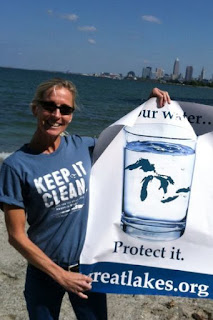According to a study by the Alliance for the Great Lakes, the beaches in Northeast Ohio had the most plastic cigar tips found anywhere in the Great Lakes region.
Last year, volunteers with the conservation group's Adopt-a-Beach cleanup programs collected more than 28,000 plastic cigar tips from the sandy beaches at Edgewater Park, the Huntington Reservation and Euclid Beach/Villa Angela. The cigar mouthpieces accounted for 37% of all the trash collected in 2014, the study found.
While the toxic algae and E. coli bacteria cleanups could take decades, the solution for ridding the lake's beaches of cigar tips and other plastic litter may prove to be simpler, conservationists say.
In addition to the volunteer cleanup crews, the National Oceanic and Atmospheric Administration recently awarded a $32,860 grant to the city of Cleveland to hire a consultant to develop a marketing campaign aimed at cigar-smokers. The community-based social marketing plan will attempt to change smoker habits when disposing of the cigars, said Cathi Lehn, coordinator of Sustainable Cleveland.
One of the proposals would provide pocket disposable ash trays to hold the cigar butts until they could be tossed into a trash receptacle.
A common misconception is that the cigars were smoked on the beaches, then snuffed out in the sand. Actually, the great majority of the plastic trash washed onto the beach from the lake, where it was deposited after being flushed out of storm water sewers.
"If people are tossing garbage onto the ground, rainwater will carry it to the local waterways and into storm sewers, and it makes its way to Lake Erie. Then it washes onto the beach," said Jean Smith, a spokeswoman with the Northeast Ohio Regional Sewer District.
Much of the trash is concentrated on the Edgewater and Euclid beaches because that is the location of two giant sewer pipes that are prone to overflow with raw sewage and storm water following heavy rains.
The so-called combined sewer overflows have been reduced by half since 1972, from a one-time high of 9 billion gallons a year to a current average of 4.5 billion gallons a year.
The other key factor in the influx of plastic cigar tips on the lake beaches is the growing popularity of cheap flavored cigars among young people. The little cigars are among the fastest growing segments of the tobacco marketplace – especially among young black men, according to a study by the Cleveland-Cuyahoga County Behavioral Risk Factor Surveillance Survey.
As many as one in five African Americans, aged 18 to 29, smoke the little cigars, such as Black 'N' Milds and Swisher Sweets, according to the survey. The cigars typically are flicked onto the streets or sidewalks after being smoked, where they are flushed into the sewers.
With a stroke of ingenuity, a Collinwood architect/artist is putting into practice the proverb, "One man's trash is another man's treasure."
After Allison Lukacsy arrived in Cleveland in 2011, she was shocked to encounter Lake Erie beaches inundated with non-biodegradable plastic cigar tips, cigarette filters and other rubbish. She joined the community cleanup crews, and began constructing artwork from hundreds of the cigar tips she collected from the beaches.
Lukacsy adorned picture frames with the plastic tips to replicate baroque sprays of garland. She covered tabletops, chairs and furniture with the cigar mouthpieces, and packed them into ottoman-sized stools.
Lukacsy was even commissioned to construct a replica of a giant fish, a perch eight feet long and four feet tall, consisting entirely of cigar tips and other pieces of plastic beach rubble, which she originally displayed at the Great Lakes Science Center. Now it's at the City of Cleveland's water pollution control center in the Glenville neighborhood.
"Some people are grossed out by the whole concept," said Lukacsy, 28, a designer and project manager at GLSD Architects in Cleveland. "But it gives me the opportunity to inform people about how much of a problem this is."
At first, Lukacsy displayed her cigar tip artwork in a vacant storefront in the Waterloo Arts District. Later, she took her pieces on the road to art fairs.
"People would walk up, and as they got closer they would stop as if to say, 'Something's not right here. What is this?'" Lukacsy said. "That's when I'm able to capture their attention. Through art I have a captive audience."
Hyle White Lowry, Ohio outreach coordinator at the Alliance for the Great Lakes, praises the work of the Sewer District and the volunteer beach clean up crews. But she knows those groups alone won't be able to eliminate cigar tips and the rest of the plastic pollution from the Lake Erie beaches.
"With climate change, there are more storms, they last longer and are more intense. It's a challenge," Lowry said.
She is hopeful that the city's grant-financed pilot program will succeed in reaching the cigar smokers.
"If we can figure out that part of the puzzle that would be huge headway toward making an impact," Lowry said. "To make them aware so that they can make better choices, act more responsibly and understand how their conduct is impacting their community."
CLEVELAND, Ohio – Add another scourge to the record-setting algal blooms and bacteria pollution issues afflicting Lake Erie's beaches: plastic cigar tips.
Resource:http://www.cleveland.com/metro/index.ssf/2015/12/plastic_cigar_tips_pose_latest.html


No comments:
Post a Comment